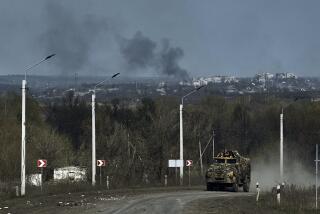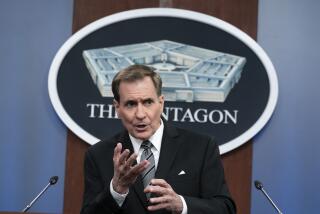Panama Invasion Plan Leaked, General Says : Security: The commanding officer says disclosure by an unknown source led to increased U.S. casualties.
- Share via
WASHINGTON — The U.S. Army general who led December’s invasion of Panama said Monday that the security of the operation was compromised by a still-unknown source, forcing the military to speed up the invasion by 15 minutes and increasing the casualties suffered by American forces.
Lt. Gen. Carl W. Stiner also said that military commanders were surprised by the intensity of the opposition from the Panama Defense Forces and by the strength and organization of the so-called Dignity Battalions, the militia groups that waged a guerrilla campaign against American troops for three days after the Dec. 20 invasion.
“We didn’t have the intelligence we should have had on the Dignity Battalions,” Stiner said. “They were stronger and more formidable to deal with . . . because they just faded back into the population,” he added.
Despite the acknowledged flaws, Stiner called the operation an unqualified success and said the American military “didn’t learn a single lesson” from the brief war.
“There were no lessons learned from this operation,” the three-star general said. “We validated that what we’re doing is right. We validated our training program.”
Stiner, who commands the 18th Airborne Corps based at Ft. Bragg, N.C., was the on-the-ground commander of the massive invasion that crushed the Panamanian military and led to the apprehension of former dictator Manuel A. Noriega, currently in federal prison in Miami awaiting trial on drug-dealing and money-laundering charges.
The general met with reporters at the Pentagon on Monday for a briefing on what the Army refers to as “lessons learned” from the military action.
While he denied that the Army found any problems with the operation, Army officers in confidential internal reports have conceded that the invasion pointed out gaps in training of military police and in preparations for warfare in densely populated urban areas.
Several days of anarchy, including widespread looting, followed the American decimation of the Panama Defense Forces, which under Noriega was responsible for all police functions in addition to its military duties.
Stiner said that word of an impending invasion leaked out at least three hours before H-hour, 1 a.m. EST on Dec. 22. He said the Army was investigating three possible sources of the leak:
A State Department official called a friend who worked for the Panama Canal Commission, saying that the invasion was set for that evening, and warned him to “get your kids off the street.” It is not known whether the warning then circulated.
The National Security Agency, which handles all communications intercepts, detected a high-speed “burst broadcast” from Cuba to Nicaragua several hours before the U.S. troops landed in Panama. Officials are still trying to decipher the message.
Broadcasts on American television at 10 p.m. EST the evening of the invasion said that the 82nd Airborne Division had left Ft. Bragg and was headed for Panama.
“I don’t know how it was compromised, but it was compromised,” Stiner said. “I knew we’d have enough combat power but we took more casualties than we would have.”
American forces suffered 23 dead and 324 wounded in the invasion, which involved 26,000 U.S. troops.
He said that American commanders tried to accelerate the attack, but it was impossible to speed up the operation by more than 15 minutes because the invasion army was to hit 27 targets in Panama simultaneously with paratroopers, helicopters, AC-130 gunships and special operations forces.
Stiner said that warning of the attack allowed some Panamanian officers to arm their soldiers and move them into defensive positions. He said captured troops told Army interrogators that Panama Defense Forces officers told their troops: “Don’t believe a word Americans tell you . . . they intend to torture you and kill you.”
Panamanian officers then abandoned their soldiers, Stiner said.
“They left them to die. That first night we didn’t capture a single field-grade officer,” he said.
Panamanian propaganda motivated the troops to fight harder than expected, Stiner said. He noted that belligerent Noriega radio broadcasts in advance of the operation “had the same effect mentally (on young Panamanian soldiers) as Hitler’s speeches in the early days of World War II.”
More to Read
Sign up for Essential California
The most important California stories and recommendations in your inbox every morning.
You may occasionally receive promotional content from the Los Angeles Times.












